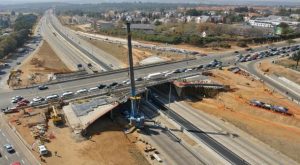The recent approvals by Nigeria’s Federal Executive Council (FEC) testified that President Bola Tinubu administration’s efforts to modernize infrastructure are fully on track.
The Tinubu Stakeholders Forum (TSF), a political support group, in Abuja on Tuesday noted that those initiatives were as a result of financial engineering in the aftermath of the removal of fuel subsidy.
In a statement jointly signed by its Chairman Ahmad Sajoh and Secretary Josiah Afolabi, TSF said: “We are proud to highlight the Nigerian government’s unwavering commitment to transformative infrastructure projects and economic policies, as recently approved during the recent 2-day Federal Executive Council (FEC) meeting.
“These initiatives are poised to significantly enhance Nigeria’s infrastructure, drive economic growth, and improve the quality of life for all citizens and we have no doubt that those projects and policies will revolutionize Nigeria’s infrastructure and housing sector through strategic public-private partnerships.
“They are expected to unlock approximately N2 trillion in investments, aimed at accelerating the construction and modernization of critical infrastructure and providing affordable housing solutions.
“This ambitious plan including the provision of low-interest yielding 25-year mortgages, will make home ownership more accessible to ordinary Nigerians.
“These projects all part of the “Renewed Hope” agenda of the Tinubu administration, which aims to modernize Nigeria’s infrastructure and enhance economic corridors.
“In a significant move to address previously neglected projects, the government approved the reconstruction of several vital roads, including the Lokoja-Benin-Okpela road. This project, valued at N120 billion, will be funded by BUA Cement under the tax credit scheme, ensuring sustainable financing.
“Other crucial road projects have also received approval, such as the Koton-Karfe-Abaji Road along the Abuja-Lokoja route, costing N89 billion, and the Lagos-Calabar Coastal Superhighway, with an additional investment of N1.6 trillion.
“These projects will greatly improve connectivity, reduce transportation costs, and boost economic activities across regions.
“The strategic removal of fuel subsidy has freed substantial government funds, enabling increased investment in these vital infrastructure projects.
“This reallocation of resources ensures that the government can effectively fund these transformative initiatives without financial strain. The economic benefits of these projects are vast, including enhanced connectivity, reduced transportation costs, and boosted trade and economic activities.
“Furthermore, these initiatives are expected to create sustainable job opportunities and stimulate local economies, contributing to long-term economic stability and growth.
” We are also elated by the decision for a comprehensive review of the visa policy. with a view to allowing applicants to receive visas within 48 hours and potentially waiving visa requirements for certain countries.
“This move will go a long way to attracting tourists, business people, and creative professionals while also fostering greater economic and cultural exchange.
“Let us not forget that FEC approved several critical infrastructure projects, including the building of bus terminals and transport facilities in Abuja.It also has set the ball rolling for the transition to renewable energy sources, such as compressed natural gas (CNG) and solar power to promote sustainable energy solutions.
“We have no doubt that the Tinubu administration’s strategic initiatives and robust funding mechanisms demonstrate a rare commitment to delivering on promises and fostering a brighter future for all Nigerians.”
TSF is convinced that those projects will not only address the nation’s immediate infrastructure needs but also lay the foundation for long-term economic stability and growth.














